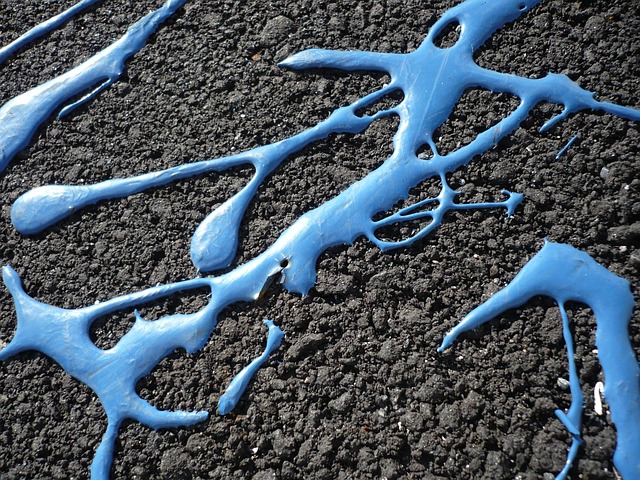Grout sealing is a critical, long-term solution for maintaining commercial spaces, specifically in high-traffic areas prone to mold and mildew. By protecting grout lines from water, oil, and contaminants, it prevents staining and reduces cleaning costs. This process enhances the aesthetic appeal of spaces while guarding against structural damage caused by moisture intrusion. Regular sealing is essential for damp areas to inhibit mold growth and preserve the initial allure of commercial properties. The right sealer, applied correctly and maintained properly, creates cleaner, safer environments and prevents the need for frequent, costly cleanups.
Commercial grout sealing is an essential maintenance practice for any high-traffic area. Understanding the basics of grout sealing, its role in commercial spaces, and the problems it solves, like mold and stains, is crucial. This article guides you through everything from the benefits of commercial grout sealing to choosing the right products and maintaining your sealed grout lines. By the end, you’ll know how to protect your commercial space with effective grout sealing.
Understanding Grout Sealing: The Basics

Grout sealing is a crucial process in maintaining the hygiene and aesthetic appeal of your commercial spaces, especially in high-traffic areas like bathrooms, kitchens, and entryways. It involves applying a protective coating to grout lines, preventing mold and stains from forming. Mold and mildew thrive in dark, damp environments, and grout lines often provide the perfect breeding ground due to their depth and difficulty in cleaning. Regular cleaning can be cumbersome and ineffective over time, making grout sealing an excellent long-term solution.
By sealing grout, you create a barrier that repels water, oil, and other stains, ensuring your surfaces remain clean and fresh-looking. This is particularly important in commercial settings where first impressions matter and maintenance costs can accumulate quickly. A sealed grout surface is easier to wipe down and maintain, reducing the overall effort and resources required for cleaning. Moreover, it enhances the longevity of your grout, preventing damage caused by moisture intrusion and ensuring a seamless, attractive finish that complements your space’s design.
The Role of Grout in Your Commercial Space

Grout, often an afterthought in commercial spaces, plays a crucial role in maintaining the aesthetics and longevity of your property. It’s more than just a filler; it provides structural support between tiles, creating a seamless finish that enhances the overall look and feel of your space. In commercial settings, where floors see heavy foot traffic, proper grout installation and regular maintenance are essential to prevent damage and ensure a safe environment for occupants.
One of the primary reasons for grout sealing is to protect against mold and stains. Grout, especially in damp environments like bathrooms, kitchens, or gyms, can become a breeding ground for mold if not sealed correctly. Sealing grout not only adds a layer of protection but also makes cleaning easier, preserving the initial beauty of your commercial space and ensuring it remains a welcoming and healthy environment for employees, customers, or clients.
Why Prevent Mold and Stains?

Grout sealing is a vital step in maintaining the aesthetic appeal and longevity of your commercial spaces, especially in high-traffic areas like restrooms, kitchens, or entryways. One of the primary reasons to prioritize grout sealing is to prevent mold and stains from forming. Mold thrives in dark, damp environments, which are precisely the conditions that grout, without protection, provides a perfect breeding ground for it. Over time, mold not only damages the appearance of surfaces but also poses health risks to occupants, making it a significant concern for any commercial property manager.
Additionally, stains are an unsightly issue that can be particularly challenging to remove once they set in. From water damage and urine stains from frequent use to spills and dirt tracking in from outside, grout is prone to discoloration. Sealing acts as a protective barrier, creating a non-porous surface that repels liquid and prevents stains from penetrating deep into the grout lines. This simple step can save time and money on costly cleaning and maintenance, ensuring your commercial spaces remain fresh, clean, and inviting for all visitors.
Common Causes of Grout Damage

Grout, often an overlooked element in commercial spaces, can face numerous challenges that lead to damage over time. One of the primary culprits is water intrusion, which can happen due to faulty plumbing or poor sealing around sinks, showers, or floors. This moisture seeps into the grout lines, causing it to expand and contract, leading to cracks and eventual disintegration. Another common issue is mold growth, especially in areas with high humidity levels, as grout provides an ideal breeding ground for mold spores. The organic material in grout attracts these spores, resulting in unsightly stains and health hazards if left unchecked.
To mitigate these issues, commercial grout sealing becomes an indispensable practice. Sealing products form a protective barrier, preventing water and mold from infiltrating the grout. This simple step not only preserves the aesthetic appeal of spaces but also ensures longer-lasting grout, reducing the need for frequent replacements. By addressing these common causes of damage, businesses can create a cleaner, safer environment for their patrons and employees, all while saving on costly maintenance in the long run.
The Benefits of Commercial Grout Sealing

Commercial grout sealing is a proactive measure that offers numerous advantages for maintaining clean, healthy, and aesthetically pleasing spaces. One of the primary benefits is its ability to prevent mold and stains from forming in grout lines. Grout, being porous, can trap moisture and organic compounds, creating ideal conditions for mold growth. Sealing these pores effectively blocks out humidity, preventing mold colonization and associated health risks.
Moreover, sealing prevents stains from penetrating the grout. Everyday substances like dirt, grease, and food spills can leave behind stains that are challenging to remove once they set in. A sealed grout surface repels these contaminants, making cleaning easier and more efficient. This not only saves time and money but also helps maintain the overall integrity of commercial spaces, ensuring they remain inviting and professional.
Choosing the Right Sealing Products

When it comes to commercial grout sealing, selecting the appropriate products is paramount for achieving long-lasting results. The primary goal is to create a protective barrier against moisture and dirt, which are major contributors to mold and stain development. Choosing the right grout sealer involves considering factors such as surface type, traffic intensity, and desired longevity. Water-based sealers, for instance, are versatile and suitable for various surfaces but may not offer the same durability as solvent-based options.
For grout sealing to prevent mold and stains effectively, opt for high-quality products designed specifically for commercial settings. Look for sealers with robust moisture resistance and a track record of repelling dirt and grime. Additionally, ensure the sealer is compatible with your grout material to guarantee optimal adhesion and long-lasting protection. This strategic choice will not only enhance the aesthetic appeal of your space but also contribute to easier maintenance in the long run.
Application Process: Step-by-Step Guide

The application process for commercial grout sealing is a straightforward yet meticulous task that involves several key steps. Begin by thoroughly cleaning the grout areas, removing any existing dirt, mold, or debris using a suitable cleaner and scrub brush. This preparation ensures optimal adhesion of the sealant. Next, assess the condition of the grout lines; if there are any damaged or missing sections, repair them before proceeding.
Once the grout is ready, apply a liberal amount of high-quality grout sealer using a brush or sprayer, ensuring even coverage. Allow the sealer to dry according to the manufacturer’s instructions, usually between 24-48 hours. After the initial dry time, lightly sand the sealed grout lines with fine-grit sandpaper for a smooth finish. This process not only enhances aesthetics but also creates a seamless barrier against moisture and stains, thus preventing mold growth and maintaining a clean, professional look in commercial spaces.
Maintenance Tips for Longevity

Proper maintenance is key to ensuring your grout sealing lasts for years, protecting against mold and stains. Regularly cleaning your sealed grout with a mild detergent and soft brush helps remove any dirt or debris that may accumulate. Avoid using harsh chemicals or abrasive tools, as these can damage the sealant and compromise its effectiveness.
Additionally, monitoring humidity levels in the areas where grout is present is essential. High moisture content can lead to mold growth and stain formation. Using dehumidifiers or ensuring proper ventilation can help maintain optimal conditions. Regular inspection of the sealed grout is also crucial; look for any signs of wear, peeling, or damage and address them promptly to prevent further issues.
